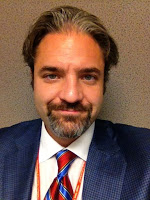I am T. Eugene Day and This is How I Work
 Today, I am inviting T. Eugene Day in the “How I Work” series. Eugene has a Doctor of Science in Electrical and Systems Engineering from Washington University in St. Louis, where he also attended undergrad. From there, he moved to the St. Louis Veterans Administration Hospital, where he was a Health Systems Specialist and Principal Investigator. He joined The Children’s Hospital of Philadelphia in March of 2013. He has been a VA HSR&D and foundation funded PI, and has published about 15 peer-reviewed articles. He is also a recreational endurance runner, and a musician.
Today, I am inviting T. Eugene Day in the “How I Work” series. Eugene has a Doctor of Science in Electrical and Systems Engineering from Washington University in St. Louis, where he also attended undergrad. From there, he moved to the St. Louis Veterans Administration Hospital, where he was a Health Systems Specialist and Principal Investigator. He joined The Children’s Hospital of Philadelphia in March of 2013. He has been a VA HSR&D and foundation funded PI, and has published about 15 peer-reviewed articles. He is also a recreational endurance runner, and a musician.
Current Job: Principal Investigator and Principal Health Systems Specialist for The Children’s Hospital of Philadelphia
Current Location: Philadelphia, PA, USA
Can you briefly explain your current situation and research to us?
I work in the office of safety and medical operations (OSMO) at The Children’s Hospital of Philadelphia. I design and deploy computer simulations of clinical and operational systems to support patient safety, access, quality, performance improvement, and strategy. Additionally, I do quality improvement research and systems research on health care delivery.
What tools, apps and software are essential to your workflow?
I need to have access to a Discrete Event Simulation (DES) software suite, or programming language in which I can write my own. Beyond that, I need access to data, and a simple processing suite such as a spreadsheet.
What does your workspace setup look like?
I have a cubicle in the basement of the hospital, along with the entire OSMO staff. I work from home about two-three days a month. Sometimes I work overnight or weekends when observing a 24-hour clinical or operational process such as the emergency department or sterile instrument processing.
What is your best advice for productive academic work?
It’s like anything else in life: do something to make progress every working day. Follow up with people. Don’t assume anyone else will drive projects you’re interested in. Ask for the help you need, and always be willing to learn by asking “stupid” questions.
How do you keep an overview of projects and tasks?
I have an outlook calendar, and mostly, I just keep stuff in my head.
Besides phone and computer, do you use other technological tools in work and daily life?
Almost none.
Which skill makes you stand out as an academic?
I’m not sure I do stand out. But I’d say that my success is related to being able to communicate what I do clearly to people who do not have the technical skills that I do. And being able to listen and understand when medical colleagues use jargon.
What do you listen to when you work?
Nothing.
What are you currently reading? How do you find time for reading?
I just finished Neal Stephenson’s Seveneves. I read a lot of bad adventure fiction. And I read a lot of random blogs. I hold myself pretty strictly to a 40 hour work week. When there are specific demands, I put in more hours, but I feel free to cut them when those demands pass.
Are you more of an introvert or extrovert? How does this influence your working habits?
I go through phases and have aspects of each. But I enjoy talking about my work, and so the tendency to be extroverted professionally is useful.
What’s your sleep routine like?
In bed by 10:30. Up at 6:30.
What’s your work routine like?
At work at 7, head home at 3. Email and various tasks managed in the evening if necessary.
What’s the best advice you ever received?
“Everything good in my life I have because I did something I didn’t want to do.” If you want to achieve goals, you’ve got to put in the difficult, tedious work to get there.
